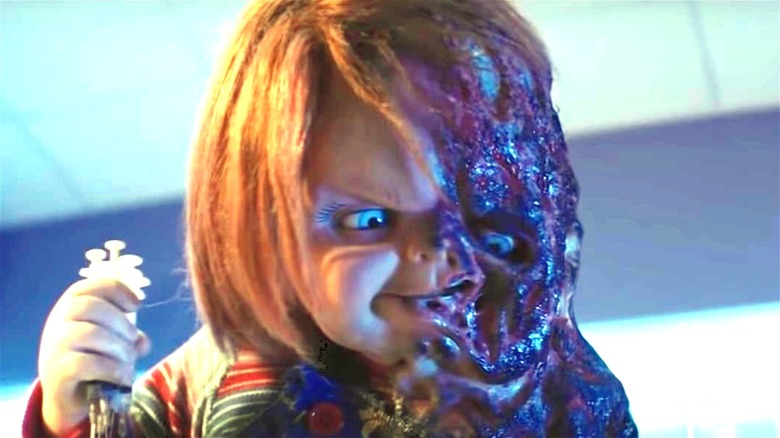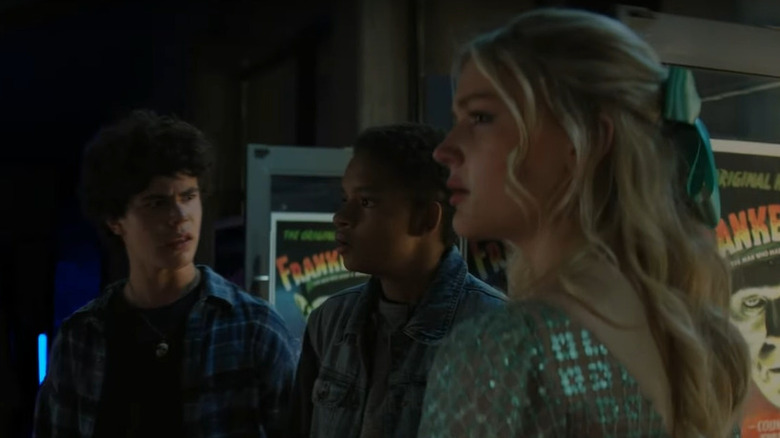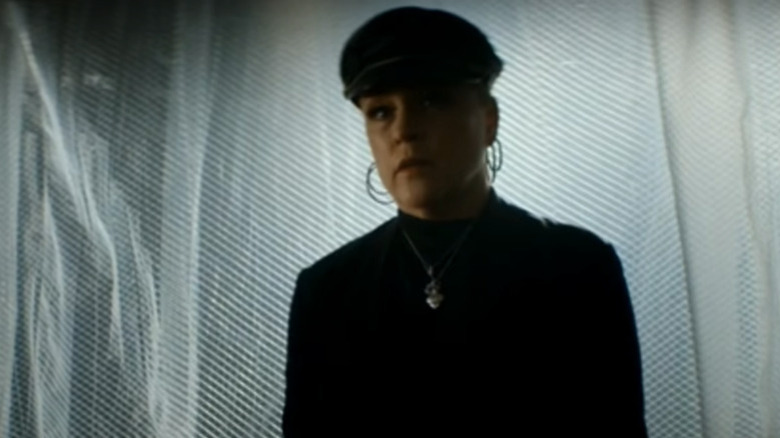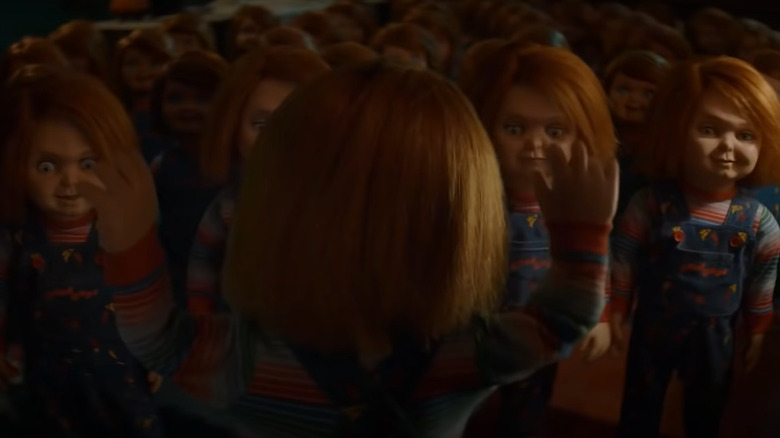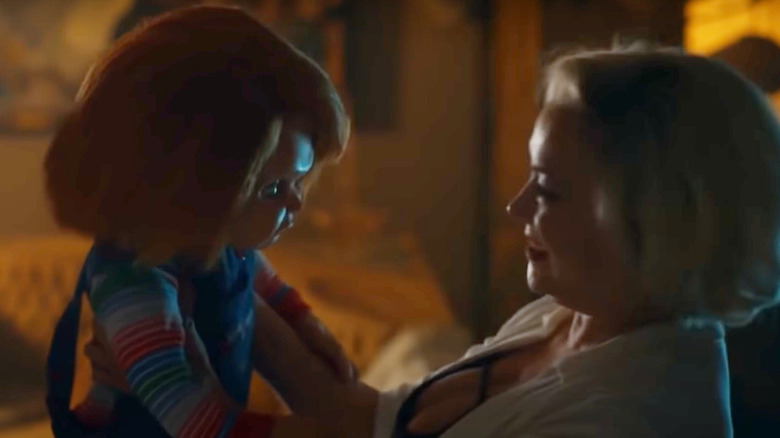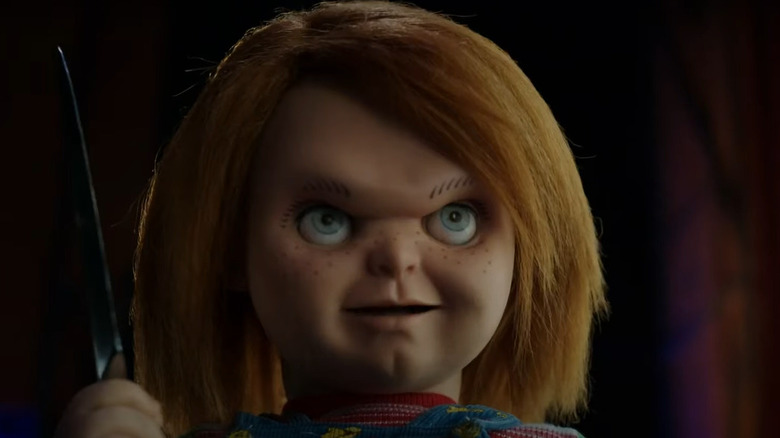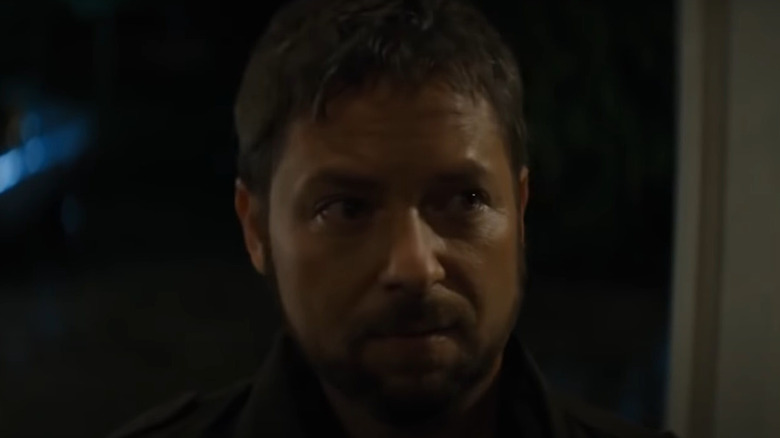The Ending Of Chucky Season 1 Explained
Syfy's "Chucky" has been a rip-roaring rampage of success for the network. Recently renewed for Season 2, the horror-comedy series pulls no punches with plenty of explicit language, risqué situations, and — in its final Season 1 episode, titled "An Affair to Dismember" – some major gore.
After a full season of trying and failing to charm Jake Wheeler (Zackary Arthur) into killing for him, Chucky (voiced by Brad Dourif) finally finds a willing accomplice in the mourning Junior (Teo Briones) who dispatches his cheating father with a couple of swings of the old' Chuckster. Finally having corrupted the soul of a child, Chucky strives to put the next part of his master plan into action. This means Jake, Lexy (Alyvia Alyn Lind), and Devon (Björgvin Arnarson) were in major danger as the first season finale rolled around.
You might be curious as to what went down in Hackensack, and how "Chucky" set up its upcoming second season. Just what did that trail of blood lead to, and what does it all mean? We have the answer.
The past and present collide in Hackensack
There's a lot going on in the first season finale. We'll break things down by groups.
Tiffany Valentine (Jennifer Tilly) and her Chucky — still encased in the body of Nica Pierce (Fiona Dourif) — are in a fight to the death when Junior and his Chucky find them after dodging Andy Barclay (Alex Vincent). Chucky plans to have the army of clone dolls he's amassed distributed to sick kids nationwide. He has Tiffany — posing as Jennifer Tilly – announce this feat at a Hackensack movie theater during a charity showing of "Frankenstein" being held by Lexy's mother. But Chucky didn't count on his conflict with Tiffany to boil over. It results in his beheading at her hands and her expressed preference for Nica — possessed by Chucky or not. She rigs his childhood house with explosives to kill Andy but instead ends up catching his foster sister Kyle (Christine Elise) in the crosshairs. Worse, Tiffany manages to lose her grip on Devon.
Devon and Jake meet up and cement their status as boyfriends. Lexy, Devon, and Jake then arrive at the theater to stop the truck filled with Chucks from leaving for parts unknown, only to discover that Lexy's little sister has claimed one of the dolls as her own and that it has gone on a rampage in the theater, taking out Lexy's dad in the process. Behind the screen, Lexy and Junior hash out their relationship issues while Jake finally confronts Chucky. In the aftermath, the teenagers watch Andy — who pauses to give them a thumb's up — drive away with the dolls. But he's stopped during his journey by a gun-wielding Tiffany doll, and directed to drive the truck toward the offramp leading to Teterboro Airport.
Why did Chucky kill Junior, and is Kyle really dead?
Arguably the biggest question of the finale is: Why did Chucky kill Junior after cultivating his willing partnership? He'd spent weeks failing to convince Jake to off his friends — specifically the formerly-cruel Lexy — only to have half of his face melted for his troubles. One would think that he'd stick with Junior, even though he lacked immediate willing obedience. It's not as if he's not used to his partners threatening his life and disobeying his orders, just look at Tiffany. But the kid made a cardinal mistake in the world of the Chuckster — he flinched in the clutch twice, first refusing to kill Nica when a blow to the head fully restored her original personality, then refusing to kill Lexy. Even though it meant his own certain death, Junior chose to protect Lexy, and the kid ended up going out a hero. That served to echo the show's overall theme that good can prevail over evil, even if a great sacrifice must be made in the process.
The other big question: Is Kyle really dead? While we see a screen capture of a webpage on Jake's phone that reports multiple fatalities at Chucky's former home, we don't see any bodies. In a world where Tiffany and Chucky have lived and died and lived again, it's impossible to see death as a permanent thing. Devon escaped the explosion, and aside from Chucky's meaty, beheaded form, there weren't any other living beings in the house. How could multiple fatalities therefore exist? Was Chucky reported as a body? Did Kyle escape? Is she the mysterious black-gloved individual watching the kids plant flowers on Junior's grave at the end of the episode? Those are questions that will likely be answered in Season 2.
Duos and doppelgangers reman a key theme in 'Chucky'
The franchise's long fascination with doppelgängers — established back in "Seed of Chucky," which introduced the in-universe Tiffany dead-ringer Jennifer Tilly as an outsized version of herself doing battle with Chucky and Tiffany — continued in this episode. Chucky and his clone army are a huge factor in the plot, and while they all seem to share his love of murder, they're individuals on a personal scale. None of them have a pre-established baseline morality of their own until Chucky breaks things down for them (we'll touch on that below).
Twins, in general, have been a theme throughout the show — Jake's dead father and equally dead uncle were identical twins, for instance. There was even a song about twins in the series premiere. In this episode, one of the Chuckys expresses his concern about twins ganging up on him during a fight. Might the show be preparing for the return of Glen and Glenda in Season 2? Or are Don Mancini and his crew using a twin metaphor to explain the slight difference between good and evil? That could be expanded on in future seasons.
Chucky and Tiffany's animosity has a pre-series history
The love/hate relationship between Tiffany and Chucky has always been a bloody see-saw ride between domestic harmony and barely-veiled hatred. All the way back in "Bride of Chucky," it was established that Tiffany and Chucky have had a difficult connection, one that includes verbal and domestic abuse. He kills her in that movie but they also embark on a happy marriage. From "Bride" to "Seed" to "Cult of Chucky" to SyFy's "Chucky," they bounce between being sniping partners who can't agree on what sort of life they should be living together to well-honed sharks circling their latest victims.
The season finale of "Chucky" added a whole new twisted layer to their partnership, as audiences learn that Tiffany was the one who tipped cops off to Charles Lee Ray being the Lakeshore Strangler. She did it mainly out of jealousy because he persisted in having affairs and conducting a social life that didn't include her. Predictably, that fuels her reaction to Chucky-possessed-Nica and Junior's Chucky forming a bond and tuning her out.
Their complicated relationship leads to a shocking scene at the end of the episode. Tiffany decides the best thing to do to protect herself and preserve her relationship with Nica is to hack off Nica's arms and legs. That way, if Nica's "Chucky" side comes back and she regains the ability to walk — and thus kill — Tiffany won't be vulnerable. There's something both incredibly sad and revealing about Tiffany's choice here, and it doubles the audience's sympathy for Nica.
Chucky's moral code adds new layers to the character
In the final episode of Season 1, Chucky lays out a moral charter for his army of clones: no killing babies, eventually defined as "anyone under five or six." "We're not savages. Besides, they make better stool pigeons," he says. Not only is that proof that the child-taunting serial killer has a heart, but it also charts out a moral horizon for him, albeit a thin one. Just like his apparent reconciliation with his genderfluid child Glen/Glenda, these details humanize Chucky, who can occasionally be difficult to like when he veers too hard into sociopathy.
That moral code also explains why Chucky's never tried to transfer his soul into the body of someone even more vulnerable than Andy back in the '80s. He'd also have to deal with being even more vulnerable than he is in the body of a doll. Chucky also reveals that he "hates guns" during the Season 1 finale. That's understandable, considering he died in a hail of bullets back in "Child's Play."
Chucky continues to be about the eternal battle between good and evil
Thus far, the main theme of "Chucky" has been the same as the one that has echoed throughout the entire "Child's Play" series — the triumph of good over evil, even if a great struggle must ensue in the process and many lives must be lost. Poking fun at anyone groping for deeper meaning in the show's thematic theology, the finale ends with Chucky sitting before a fire with a large, red, leather-bound book as he quickly segues from talking about the meaning of life to giving the audience a kill count of all of the people he offed during the first season.
For instance, Andy's battle against Chucky is an endless slog he's been fighting since he was seven, and every time he thinks he's gotten the upper hand, some new wrinkle pops up to throw him off. So far, things seem a little simpler for Jake and his friends, but it's only a matter of time before Tiffany, Chucky, or some other ally of theirs upsets the balance again. Although it's not easy or fun, pushing back against evil requires constant vigilance and action.
Audiences will find out what Chucky and his many clones do to upset the table — as well as Andy, Nica, and the rest of the gang — when "Chucky" returns sometime in 2022.
